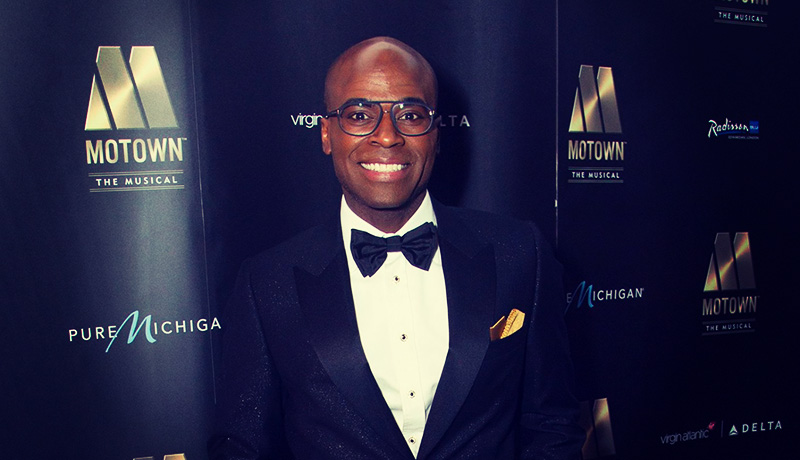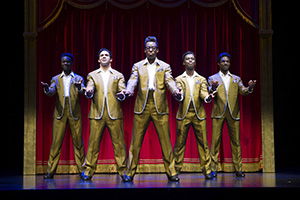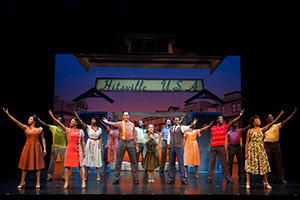

The Multi-Talented Cedric Neal
Photo Courtesy of Dan Woolle
American actor Cedric Neal moved to London in the summer of 2014 for a part in the Regent’s Park Open Air Theatre’s production of Porgy & Bess. The pull of the stage has kept him in the city ever since. Having just opened the London production of Motown the Musical (Shaftesbury Theatre, through February 2017) to rave reviews, he talks to us about growing up in a family of singers, how the West End compares to Broadway, and the honor of working with one of history’s top producers.
Tell us about getting cast as Berry Gordy, founder of Motown Records.
When my agent told me that they were calling me for Berry Gordy, I was shocked, humbled. I assumed that it would be for the Marvin Gaye or the Stevie Wonder character because that’s what I’d been called in on previously in New York. I had three auditions for the show when it was in New York, and every time my audition came up, something came up: I was either booked on another gig or I wasn’t able to make it to the audition. So, it was divine positioning that I got called to audition over here.
I now know that after my first audition here in the UK for the show that they decided they wanted me for the role of Berry Gordy. My final recall, Mr. Gordy was in the room and he was actually the person to tell me that I got cast.

The Musical’s Take On The Temptations, Photo Courtesy of Alastair Muir
How does performing in the West End compare to performing on Broadway?
I thought there would be a bigger difference between Broadway and West End audiences but the energy and the appreciation for the art of musical theater is just the same. People are just as excited to hear the story, to hear the music.
I thought London audiences would be a lot more reserved than New York audiences. That has not been the case. We’ve definitely had people dancing in the aisles during our show, which we encourage. They leave the theater dancing in the street. There’s a certain appreciation that performers get where there are people that wait at the stage door for you to come out. And I was told that did not exist over here, but every night when we come out, they’re there by the stage door, wanting us to sign an autograph, telling us how much they appreciate the show.
I assume that you were familiar with the music before auditioning — surely everyone is, right?
Of course. I’m originally from Texas and my mother and father had four children, and all of us sing. My mother sang and my dad is a singer. My dad is cousins with Sam Cooke and, if you close your eyes, you wouldn’t be able to tell if it’s my dad or Sam Cooke singing. That’s how much they sound alike. So music is in my bones, in my spirit; it’s who I am. It’s not an experience for me, it’s an existence.
My influences have been David Ruffin from The Temptations, Marvin Gaye, Stevie Wonder, Gladys Knight and Rick James. My brothers and I used to be the background singers for my dad and we would do The Temptations, and my mom would sing some Gladys Knight and my brothers and I would be her Pips. So, I cannot deny that my career is based on the Motown sound. I’m grateful for this opportunity to pay overdue respect to a sound that has carved my career and made it even possible.
What was it like to meet Berry Gordy?
My third recall for the show, we had been told that Mr. Gordy would be there. There’s a number in the show called “Can I Close The Door (On Love)” that Mr. Gordy wrote specifically for Motown the Musical. It’s a difficult song to sing. So, I go in the room and the director says, “Okay, well let’s just get it out the way. Let’s just do ‘Can I Close The Door’.”So, I sing the most difficult song to sing in the show, after Mr. Gordy’s just walked into the room. I’m sitting there going, “I am singing for Berry Gordy. This is ridiculous.”
My final recall, I go in the room, and Mr. Gordy and Charles Randolph-Wright, our director, stand up and Mr. Gordy said, “Cedric, you’re the new me.” It was daunting. He said, “I picked Michael [Jackson], I picked Diana [Ross], I picked Stevie, I picked Marvin, and I’m picking you, Cedric.” And, of course, I burst into tears. I could not believe that this man who created this legacy of superstars — I’m about to cry now as well — actually chose me. And chose me, not only to be part of the Motown legacy, but to represent him as a part of the Motown legacy.

The Glorious ‘Motown’ Cast, Photo Courtesy of Alastair Muir
How was he to work with?
Working with him, some would figure would be daunting or nerve-wracking. And there were times where it was because Mr. Gordy is not a theater person so he doesn’t know the mechanisms of theater — all he knows is he wants his story to be told and how he wants it to be told. At a certain point, it became very comfortable to have him in the rehearsal room because, if I didn’t understand a scene or [know] why a scene was in a show, he sat me down and told me exactly what was going on in his life in the scene, what he was feeling, why it was in the show, and then it just clicked.
You had some big names in to see the show on opening night. What was it like to perform to the likes of Smokey Robinson and Mary Wilson?
I’m still trying to process that. We had Smokey Robinson up on that stage with us, who was integral in the whole Motown thing. He and Berry Gordy have been best friends for almost 60 years. And then we had Mary Wilson from The Supremes — the actual Mary Wilson from the actual Supremes — on stage with us.
There’s been a lot of discussion recently around the issue of diversity in theater in the UK. How does it feel to be part of a show with such fantastic roles for talented black performers?
The problem with diversity is not a problem unique to London, or to London theater. It’s a problem across the performing arts world, period. History is being made in so many forms in this show. You have an African-American male director with an African-American leading man, telling the story of an African-American icon in London’s West End. That has never been done before. I applaud London theater for taking us in, and giving us a platform to show that we’re serious about our art as well.
Follow us on Snapchat at “forbestravel” for an inside look at our travels across the globe.
